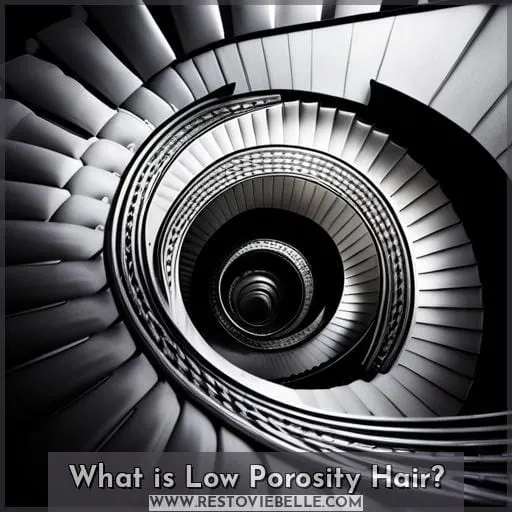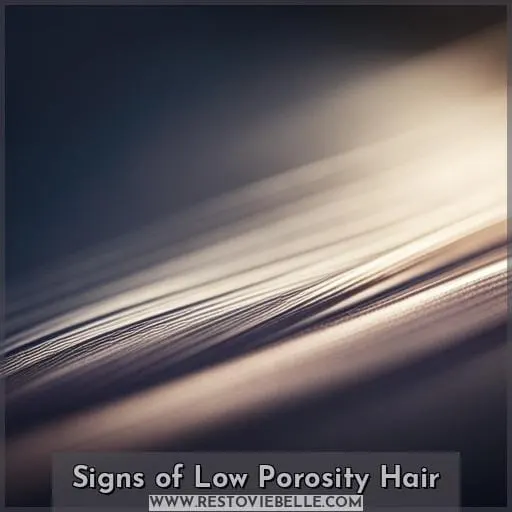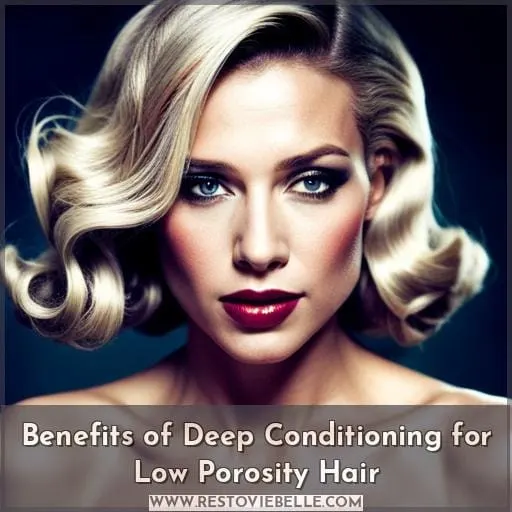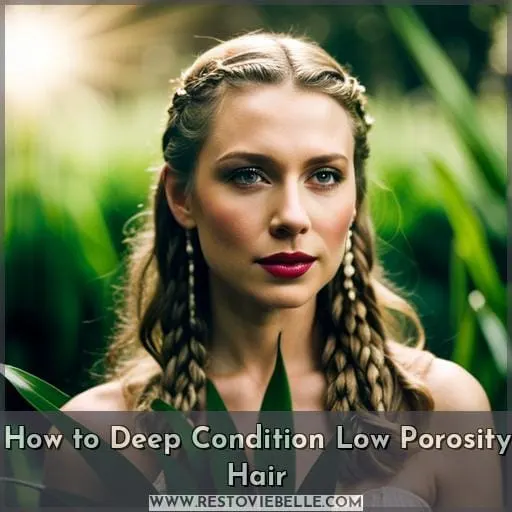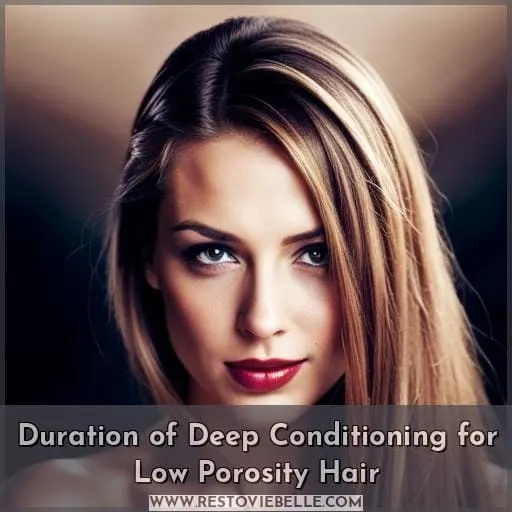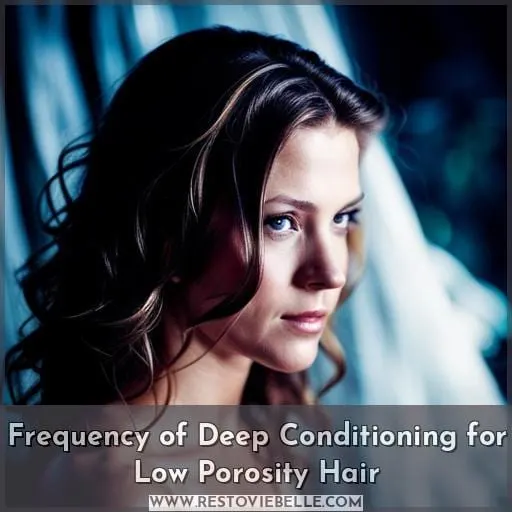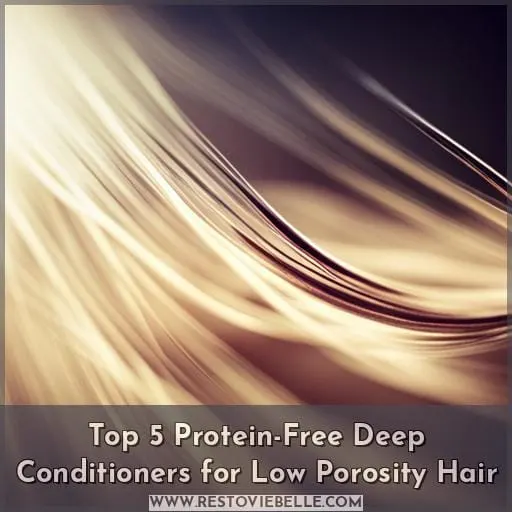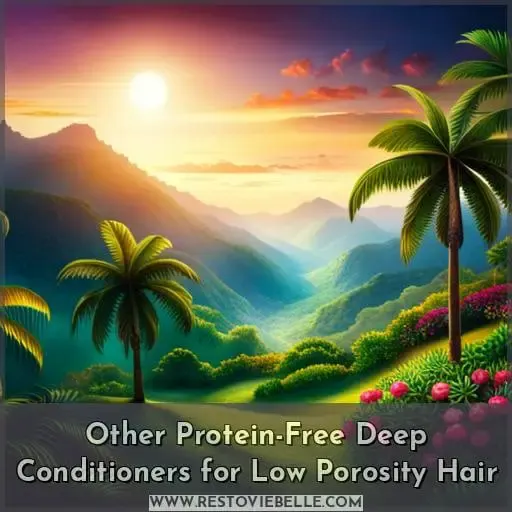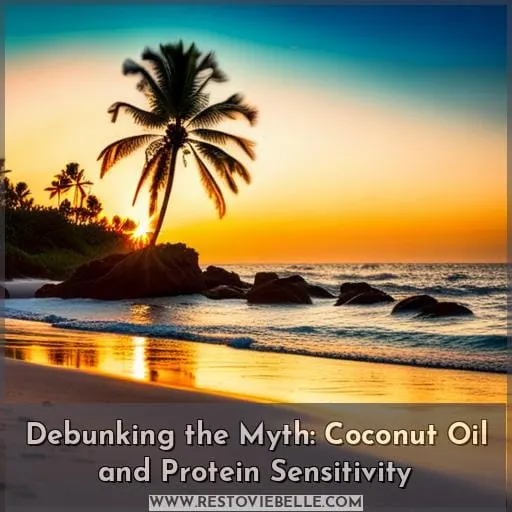This site is supported by our readers. We may earn a commission, at no cost to you, if you purchase through links.
 Are you struggling to quench the thirst of your low porosity hair? From dryness and breakage to heat damage and split ends – there’s no doubt that having low porosity hair presents its own unique set of challenges.
Are you struggling to quench the thirst of your low porosity hair? From dryness and breakage to heat damage and split ends – there’s no doubt that having low porosity hair presents its own unique set of challenges.
But don’t worry, deep conditioners for this type of tresses can offer a helping hand! By providing intense hydration with moisture retention benefits, deep conditioning treatments can improve the texture and health of your locks.
Read on as we explore all you need to know about using protein-free deep conditioners specifically designed for those with low porosity hair.
Table Of Contents
- Key Takeaways
- What is Low Porosity Hair?
- Signs of Low Porosity Hair
- Benefits of Deep Conditioning for Low Porosity Hair
- How to Deep Condition Low Porosity Hair
- Duration of Deep Conditioning for Low Porosity Hair
- Frequency of Deep Conditioning for Low Porosity Hair
- Top 5 Protein-Free Deep Conditioners for Low Porosity Hair
- Other Protein-Free Deep Conditioners for Low Porosity Hair
- Debunking the Myth: Coconut Oil and Protein Sensitivity
- Conclusion
Key Takeaways
- Deep conditioning is crucial for low porosity hair as it helps with moisture retention, manageability, hydration, and elasticity.
- Heat, such as hot towels or steam, can enhance the effectiveness of deep conditioners by opening the cuticles.
- Protein-free deep conditioners are recommended for low porosity hair to prevent stiffness and promote hydration.
- Consistency is key when it comes to deep conditioning, and it is recommended to deep condition once a week for optimal results.
What is Low Porosity Hair?
If you’re looking for the best hair care routine, understanding low porosity hair is essential. Its unique water absorption characteristics can help you find the right products to keep your locks healthy and hydrated.
Low porosity strands are characterized by their difficulty in absorbing moisture quickly. So it’s important to opt for deep conditioners with hydrating ingredients like shea butter or argan oil. These ingredients penetrate deeply into the scalp and provide lasting hydration.
Avoiding excess protein is also key. Over-use of proteins can lead to stiffness and faster drying out times on already dry strands. Be sure to look out for specific protein ingredients in product labels if your aim is maximum moisture retention while still keeping an eye on overall hair health.
Coconut oil has become a popular ingredient among those with low porosity hair. However, scientific evidence supporting these claims remains limited.
Signs of Low Porosity Hair
Now that you know what low porosity hair is, let’s look at the signs of having this type of hair.
Low porosity hair usually appears dry and feels resistant when wet. It may take a long time to become saturated with water, and even longer for it to absorb products such as conditioner or styling products.
You might also notice split ends more often than normal. Additionally, your scalp could appear oily but still have difficulty retaining moisture in its strands.
To properly care for low porosity locks, deep conditioning treatments are necessary. These treatments should be protein-free to avoid further damage from product buildup or excessive stiffness caused by protein overload in the cuticle layer of the strand itself.
Deep conditioning treatments with natural oils like jojoba oil, avocado oil, and coconut oil will work wonders in keeping your mane hydrated without overloading it with proteins. Using proteins too frequently on sensitive tresses like those belonging to low porosity heads can be damaging.
These treatments can help unlock tight cuticles, allowing better absorption rates while protecting against breakage during detangling sessions.
Benefits of Deep Conditioning for Low Porosity Hair
Deep conditioning is essential for those with low porosity hair as it helps to retain moisture and promote healthy hair growth. With regular deep conditioning treatments, you can expect improved manageability of your locks, increased hydration levels in the scalp and follicles, enhanced elasticity of strands leading to better retention of styles – all culminating in healthier-looking hair overall.
Benefits of Moisture Retention
You’ll want to look for deep conditioners that retain moisture so your hair can stay soft and healthy. The benefits of moisture retention are numerous – it helps nourish strands and protect them from damage; it improves elasticity, making the hair less prone to breakage; and regular use of a moisturizing deep conditioner will keep your low porosity locks looking lusciously shiny.
To maximize effectiveness in your hair care regimen, opt for protein-free products specifically designed for this type of hair texture.
Improved Hair Health
Regular use of protein-free deep conditioners can help restore health and strength to your hair, leaving it softer, shinier, and more manageable.
With regular conditioning treatments, the natural oils in your scalp are replenished, which improves hydration levels. This helps protect against product build-up while strengthening roots and strands for thicker locks.
Hair moisture is also improved with the addition of essential vitamins from ingredients like honey or argan oil that penetrate deeply into each strand for optimal nourishment benefits.
Additionally, reviews on low porosity hair deep conditioners can provide helpful tips about maintaining a consistent schedule, as well as duration recommendations to achieve desired results from each treatment session.
Finally, following specific advice such as avoiding rinse-out conditioner before a conditioning mask will further enhance outcomes towards achieving healthier-looking tresses!
Enhanced Hair Growth
By deep conditioning your hair regularly, you can definitely see an increase in growth and health. Deep conditioning is essential for low-porosity hair care. It helps to open the cuticle of the strands, allowing natural oils and moisture to penetrate deeper into each strand.
There are a variety of affordable deep conditioners on the market that contain beneficial ingredients like shea butter and argan oil. These ingredients nourish your strands from root to tip. Additionally, using natural remedies such as honey or avocado masks can also promote healthy growth while providing intense hydration.
With consistent use of these products in your haircare routine, you will start noticing improvements in length retention and overall strength over time.
How to Deep Condition Low Porosity Hair
Deep conditioning is a vital step in a low-porosity hair regimen as it helps to retain moisture and keep hair healthy. To get the best results out of your deep conditioner, there are certain techniques you can use to enhance its effectiveness.
First off, applying heat during your deep conditioning session will help open up the cuticles and allow for deeper penetration of nutrients into the strands. Use indirect heat with either hot towels or steamers for better results than direct heat from flat irons or blow dryers.
Additionally, make sure not to rinse out any light conditioner before beginning your treatment so that it has time to work properly on your strands without being immediately washed away by water molecules moving too quickly through them due to their hydrophilic nature characteristic of low porosity hair!
Finally, consistency is key when using protein-free products such as Shea Moisture Deep Treatment Masque and Obia Naturals Babassu Deep Conditioner.
Here are some additional tips to consider:
- Using natural oils like avocado and jojoba, along with honey, provide essential vitamins and nutrients resulting in healthier-looking locks.
Duration of Deep Conditioning for Low Porosity Hair
With regular deep conditioning, you can help unlock the benefits of low porosity hair for improved strength and moisture. The duration of deep conditioning for low porosity hair is important to note as it helps maximize the effects with minimal protein overload.
Depending on your specific needs, 10-20 minutes should be enough time to allow a quality product to penetrate deeply into your strands. To add an extra boost in hydration, consider using indirect heat like steam or warm towels during application and rinse off after 15-20 minutes with cool water.
Make sure that you use protein-free products like Shea Moisture Deep Treatment Masque or Obia Naturals Babassu Deep Conditioner as too much protein can lead to stiffness and faster drying out of your strands over time.
Maintaining a consistent schedule will ensure maximum results from these top deep conditioners for low porosity hair so make sure not to skip out!
Frequency of Deep Conditioning for Low Porosity Hair
When it comes to low porosity hair, deep conditioning is an essential part of any haircare routine. Not only does it help add moisture and hydration, but it also strengthens the strands while helping with overall hair health.
When considering how often to deep condition for low porosity hair, here are some tips:
- Aim for once a week – Deep conditioning weekly helps keep your scalp and strands healthy by providing long-term nourishment and protection from damage.
- Use heat – Applying indirect heat during the process can open up the cuticle layer of your hair, allowing deeper penetration of product benefits into each strand.
- Choose wisely – Look out for hydrating ingredients like honey or oils that will provide extra moisture retention without burdening curls with proteins they may not need or want in their products.
- Keep consistent – Make sure you stick to a regular schedule so you get maximum benefit from each session; this could be every two weeks depending on what works best for your individual needs!
With these simple steps in mind, you’ll be able to enjoy all the benefits that come along with deeply conditioned locks!
Top 5 Protein-Free Deep Conditioners for Low Porosity Hair
Are you searching for protein-free deep conditioners to maintain the health of your low porosity hair? Look no further than GroSecrets 10 Minute Mask. This revitalizing and strengthening mask is formulated with essential moisturizers such as argan oil, shea butter, olive oil, and coconut oil.
GroSecrets 10MinuteMask
Discover the GroSecrets 10-Minute Mask, a deep conditioner formulated with essential moisturizers like argan oil, shea butter, and coconut oil. It’s designed to revive dry and dull hair in just 10 minutes while providing intense moisture for ultra-dry hair.
Honey is a humectant that helps retain moisture, so the mask also contains raw honey to add shine and detangle locks. Additionally, it boasts keratin for strengthening weak strands as well as promoting healthy growth of low porosity hair.
Curlsmith Double Cream Deep Quencher
You’ll love Curlsmith Double Cream Deep Quencher, a nourishing deep conditioner that softens hair and eliminates frizz after just one use! It’s economical too – users report that a little goes a long way for intense moisture.
Perfect for all types of dry hair, the Andiroba and Resurrection Flower ingredients are key to its effectiveness as they offer hydration without weighing down fine strands. This product works best when used with Hold Me Softly or In-Shower Style Fixer to create defined curls or waves.
With its pleasant scent and versatility in managing toddler tresses, it’s no surprise this low porosity deep conditioning treatment has become so popular among curly girls looking for healthy locks!
Tgin Honey Miracle Hair Mask
Experience a miracle for your hair with TGIN’s Honey Miracle Hair Mask. This deep conditioner is packed with raw honey, jojoba, and olive oils to nourish dry, damaged, or color-treated tresses. It not only provides essential vitamins and nutrients but also helps reduce breakage while moisturizing the scalp.
User reviews report improved softness, shine, and manageability after use. From application tips to ingredient spotlight, this mask has you covered when looking for low porosity hair deep conditioners!
Comparable products include Shea Moisture Deep Treatment Masque and Obia Naturals Babassu Deep Conditioner. Both offer hydration without protein overload from coconut oil or other proteins.
Other Protein-Free Deep Conditioners for Low Porosity Hair
If you’re looking for protein-free deep conditioners to keep your low porosity hair healthy and hydrated, try Eden Bodyworks Jojoba Monoi Deep Conditioner, As I Am Hydration Elation Intensive Conditioner, TPH by Taraji Mask on Moisturizing Conditioning Mask, Camille Rose Naturals Moroccan Pear Conditioning Custard, or Alikay Naturals Avocado Moisture Repairing Mask.
All of these products are specifically formulated to provide intense moisture without the risk of protein overload.
Eden Bodyworks Jojoba Monoi Deep Conditioner
Unlock your hair’s fullest potential with Eden Bodyworks Jojoba Monoi Deep Conditioner, a luxurious treat that helps restore moisture and shine. Formulated with coconut oil and jojoba oil, it deeply hydrates low porosity hair while providing essential vitamins for healthy growth.
To use this product effectively, apply generously after shampooing on wet or damp hair.
This protein-free deep conditioner is an excellent addition to any low porosity haircare routine. When used regularly, users can expect improved hydration levels as well as stronger strands overall due to its fortifying ingredients like monoi de Tahiti flower extract and vitamin E.
As I Am Hydration Elation Intensive Conditioner
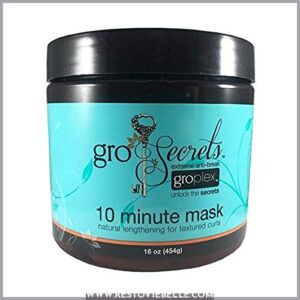 View On Amazon
View On Amazon
Discover the As I Am Hydration Elation Intensive Conditioner, a luxurious deep conditioner enriched with coconut oil to help keep your hair hydrated and healthy. It contains fatty acids that coat each strand for increased shine, moisture retention, and improved elasticity.
- Coconut Oil Benefits: Helps prevent breakage while adding softness and strength.
- Hair Hydration: Promotes long-lasting moisturization and nourishment.
- Deep Conditioning Options: Can be used as a pre-poo or post-wash treatment for added benefits.
TPH by Taraji Mask on Moisturizing Conditioning Mask
Indulge in the TPH by Taraji Mask on Moisturizing Conditioning Mask to instantly replenish moisture with its blend of jojoba oil and shea butter. This product is formulated for low porosity hair and actively works to reduce breakage while increasing elasticity.
It contains natural ingredients like coconut oil and honey, which help retain moisture and promote healthy hair growth without causing product build-up or protein overload.
To achieve the best results, use this conditioning mask as a deep conditioner after shampooing. Apply it liberally from root to tip and leave it in for 10 minutes before rinsing it out. For optimal hair health, massage your scalp during application and follow up with a leave-in conditioner after washing.
If you want to enhance hair growth, make sure to open the cuticles before applying the mask by using heat, for example.
Here are some tips and techniques to keep in mind when using the TPH by Taraji Mask on Moisturizing Conditioning Mask:
- Apply the mask liberally throughout your hair.
- Leave it in for 10 minutes before rinsing.
- Use the mask on a weekly basis for the best results.
- Massage your scalp while applying the mask.
- After washing, use a leave-in conditioner as a follow-up.
- Make sure the cuticles are open before applying the mask by using heat.
- Choose products that are coconut oil-based if possible.
- Work the mask through your hair thoroughly, starting from the roots and going all the way down.
By incorporating TPH by Taraji’s conditioning mask into your hair care routine, you can enjoy soft and nourished locks without compromising your hair health.
Camille Rose Naturals Moroccan Pear Conditioning Custard
Experience the luxurious blend of Moroccan pear and argan oil in Camille Rose Naturals’ Moroccan Pear Conditioning Custard – perfect for deeply nourishing low porosity hair. This custard is an excellent choice for moisturizing and hydrating low-porosity tresses, offering slip to help detangle knots.
Here are three key points on how to use it:
- Apply a generous amount evenly throughout damp or wet hair.
- Allow it to sit covered with a shower cap under indirect heat.
- Rinse after 15 minutes using cold water.
Ingredient analysis reveals natural oils like jojoba, avocado, coconut milk, and almond butter, which make this product ideal for those seeking intense hydration without any harsh chemicals or ingredients that could harm their locks.
User reviews rave about its lightweight application along with styling options like braids and twists because of its great hold without feeling heavy on the scalp!
Incorporate Camille Rose Naturals’ Moroccan Pear Conditioning Custard into your routine for healthy locks year-round as part of your comprehensive haircare regimen specifically tailored towards treating low-porosity strands!
Alikay Naturals Avocado Moisture Repairing Mask
Transform your tresses with Alikay Naturals’ Avocado Moisture Repairing Mask, an ultra-hydrating mask that’ll bring life back to even the driest locks! This repairing mask contains avocado oil, which has proven benefits for hair hydration and moisture retention.
It also includes shea butter, almond oil, olive fruit extract, and aloe vera juice – all ingredients designed to nourish low porosity hair with deep conditioning benefits.
To get the most out of this product, use it once or twice a week as part of your regular routine. Leave it on for 20 minutes, then rinse off with warm water. With continued use, you can expect improved softness and shine, as well as greater manageability in no time! Enjoy restored healthiness without compromising on moisture thanks to Alikay Naturals’ Avocado Moisturizing Mask – perfect for those struggling with dryness or brittle strands due to low porosity hair.
Debunking the Myth: Coconut Oil and Protein Sensitivity
Dive into the world of protein-free deep conditioning and discover why coconut oil is not always a culprit for low porosity hair. Despite popular belief, there’s no scientific evidence to support claims that coconut oil is damaging or drying on all hair types.
For those with protein-sensitive strands, it’s important to remember that moisture and proteins are both integral elements in healthy tresses.
- Hair does not hate proteins but may suffer from product buildup.
- Protein overload leads to stiffness and faster drying.
- Look out for specific protein ingredients in product labels.
- Avoiding excess protein is essential for hair health.
- Scientific evidence is needed to support claims about coconut oil.
Understanding these facts can help you make an informed decision when selecting deep conditioners free from proteins like coconut oil.
Conclusion
You’ve worked hard to care for your low porosity hair, so don’t forget to reward it with a deep conditioner! Protein-free deep conditioners are essential for maintaining moisture and improving hair health, and they’re easy to find.
Whether you choose Shea Moisture’s Deep Treatment Masque, Alikay Naturals’ Honey and Sage Deep Conditioner, or any of the other options on this list, you’ll be giving your hair the nourishment it needs.
And don’t worry about coconut oil and protein sensitivity: while it’s important to watch out for product buildup, scientific evidence shows that coconut oil is great for hair health.
So go ahead and restore your low porosity hair with the perfect deep conditioner.
